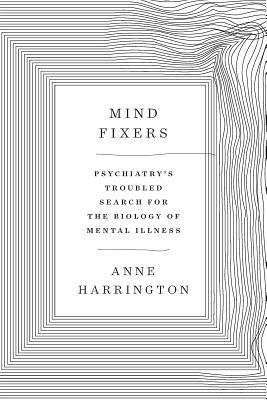
Mind Fixers
Psychiatry's Troubled Search for the Biology of Mental Illness
جستجوی پیچیده روانپزشکی برای زیستشناسی بیماریهای روانی
کتاب های مرتبط
- اطلاعات
- نقد و بررسی
- دیدگاه کاربران
نقد و بررسی

March 15, 2019
A thorough and well-researched account of the ongoing attempts to find biological bases for mental illness.In a surprisingly suspenseful narrative, Harrington (History of Science/Harvard Univ.; The Cure Within: A History of Mind-Body Medicine, 2008, etc.) traces the conflict between those who believed it would be possible to find biological causes and cures for mental illness and those who suspected that the current scientific tools were too crude to do so and that such illness could only be treated with a series of dialogues between patient and physician. In the late 19th and early 20th centuries, the author suggests, the biologists had a few victories, such as making the connection between the physical effects of syphilis and its effect on the mind, but they focused primarily on unproductive autopsies of the brains of patients. Meanwhile, the newly popular Freudians won the approval of patients with less severe mental illnesses as well as those attempting to ameliorate their symptoms. Later in the 20th century, as new drugs and techniques such as electroconvulsive therapy were discovered and heavily marketed, the balance swung temporarily toward the biologists--at least until it became clear that these drugs and techniques didn't produce the miracles their proponents initially claimed. After considering this struggle as a whole, Harrington moves on to examining it in the context of several specific forms of mental illness, including schizophrenia, depression, and manic depression. Beneath the author's firm, stately prose, which never becomes alarmist or provocative, lies a bleak assessment of the mental health profession. Its practitioners come across as hampered by the current, insufficient state of understanding of how the mind functions and malfunctions as well as prompted by jealousy, fear, greed, and a desire to one-up those they see as their competitors. Can psychiatry, Harrington asks, "acknowledge and firmly turn away from its ethical lapses--and especially the willingness of so many of its practitioners in recent decades to follow the money instead of the suffering?"A measured, insightful survey of the limits of contemporary treatment for mental illness.
COPYRIGHT(2019) Kirkus Reviews, ALL RIGHTS RESERVED.

April 1, 2019
Harrington (history of science, Harvard Univ.; The Cure Within) traces the history of psychiatry to understand the biological basis of mental illness while profiling historical figures such as German psychiatrist Emil Kraepelin and Swiss neurologist Adolf Meyer. According to the author, since the biological revolution of the 1980s, psychiatry has been in decline and is currently in crisis, citing its impact by scientific discoveries as well as social issues such as immigration, warfare, grassroots activism, and evolving discussions around race and gender. Of note to this reviewer is the coverage of how pharmaceutical CEOs in the 1990s maximized the profitability of antipsychotics by marketing them to people without mental illness. Numerous conclusions are presented on the future of psychiatry, but especially worthy of note is that the profession must share its power over patient treatment by allowing nonmedical health professionals such as psychologists to prescribe psychiatric medications. VERDICT A must-read that will interest general readers and medical professionals alike.--Claude Ury, San Francisco
Copyright 2019 Library Journal, LLC Used with permission.

























دیدگاه کاربران